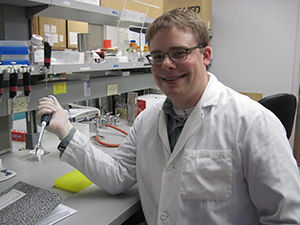Your generous donations are supporting inspiring and promising researchers who are committing their careers to finding a cure for Batten disease. Mark Schultz is one such researcher who recently graduated with a Ph.D. with the help of BBDF funding in partnership with Batten Disease Support and Research Association (BDSRA). Mark has and will continue to devote his career to finding a cure for Batten disease. Read Mark’s story below.
My first exposure to juvenile Batten disease occurred during an undergraduate neurobiology course at Wartburg College when I was assigned to write a paper discussing the current status of juvenile Neuronal Ceroid Lipofuscinosis (JNCL, juvenile Batten disease) research. I recognized that there were a lot of unanswered questions on the basic function and location of juvenile Batten disease protein, CLN3, preventing the development of effective therapy. One year later, while applying to graduate schools in medical research, I recognized the name of prominent JNCL researcher, Beverly Davidson, Ph.D. My interest in JNCL was high. I sought out a position in Dr. Davidson’s laboratory at the University of Iowa and began my graduate career as a JNCL researcher.
Choosing a research career can be difficult for unexpected reasons. There is no shortage of diseases that need dedicated investigators helping to understand why they occur, progress, and lead to devastating outcomes. There is, however, a shortage of funding; especially for rare diseases like JNCL. This is where organizations like Beyond Batten Disease Foundation (BBDF) make all the difference. Predoctoral fellowship funding of “CLN3 regulation of Cdc42 and drug screening for JNCL” from BBDF allowed me to tease apart defective cell signaling pathways. Cell signaling is a complex system of internal and external communication that governs specialized functions of brain cells. During my graduate career, we made significant headway understanding what goes wrong in the cell signaling pathways of children with JNCL and tested the application of existing medications to resolve those issues.
In addition to salary support and research supplies, BBDF funding provided me opportunities to attend multiple research conferences. These experiences gave me opportunities to get a jump on the latest findings prior to publication, to interact with leaders in lysosomal storage, neurodegeneration, and Batten disease research, to compare my findings with others, and open my foundation-funded investigations to scrutiny from leaders in discovery research and therapy development. Critical evaluation of ongoing research ensures that one analyzes and interprets data correctly and all of the pertinent historical information and evidence is taken into consideration when forming new hypotheses or drawing conclusions. Exposing my work to intense and continual scrutiny has definitely helped to advance my understanding of defective cell signaling pathways in JNCL.
In addition to research professionals, meeting attendance also gave me opportunities to meet with families affected by JNCL. Some of the most intriguing questions asked about my research have been from self-educated family members. Suffice to say, these interactions provided me with a tremendous amount of drive and motivation to push my projects forward. Predoctoral fellowship funding from BBDF was an essential component to my successful graduate career in a very difficult field. Funding allowed me to focus directly on JNCL research without worrying or devoting time to obtaining salary support from multiple sources. I graduated this past December with my Ph.D. and am excited to enter the next phase of my career in JNCL research.
Thank you!
Mark
Mark Schultz, Ph.D.

